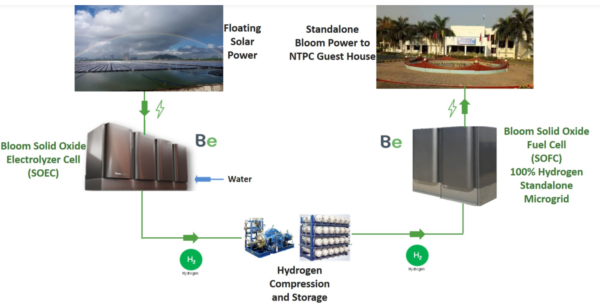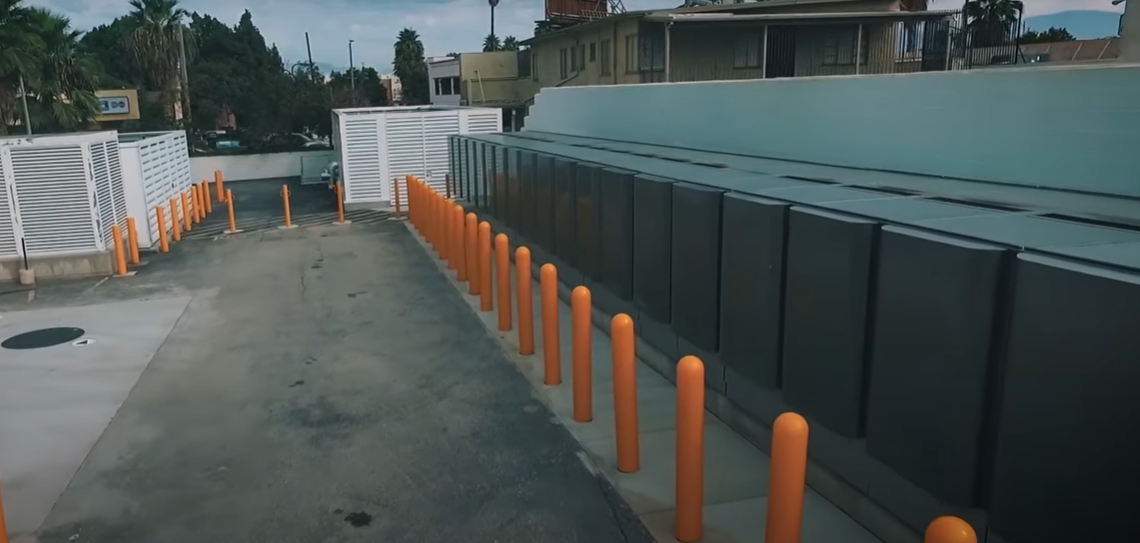California-headquartered Bloom Energy has announced that NTPC Limited, India’s largest energy conglomerate under the Ministry of Power, has selected its electrolyzer and hydrogen-powered fuel cell technologies for the nation’s first green hydrogen-based energy storage deployment.
The project will serve as a test case to explore the potential of large-scale, off-grid hydrogen energy storage and microgrid projects at strategic locations throughout the country.
Bloom Energy shall provide its solid-oxide, high-temperature electrolyzer to generate green hydrogen from renewable electricity produced by a nearby floating solar farm. The hydrogen will then be converted into carbon-neutral electricity without combustion through Bloom Energy’s hydrogen fuel cells to power NTPC’s Guest House, a local accommodation intended for use by NTPC employees and guests.
The project is expected to commence in 2022 in Simhadri, Visakhapatnam, India.
The solar farm, coupled with Bloom Energy’s electrolyzer and hydrogen fuel cells, is intended to operate around the clock. At scale, the combination could enable long-duration clean energy storage and resilient power for businesses, residential neighbourhoods, dense urban areas, and remote and island communities.
Energy-efficient hydrogen production
Bloom Energy (India), a wholly owned subsidiary of Bloom Energy, was selected for its holistic, comprehensive and efficient technology ecosystem spanning green hydrogen production and carbon-free power. The initial collaboration between NTPC and Bloom Energy India is expected to serve as a foundation for expanded future cooperation.

“Reducing carbon emissions is the number one priority in the fight against climate change, and green hydrogen will be critical to India’s decarbonization objectives,” said Venkat Venkataraman, executive vice president and chief technology officer, Bloom Energy.
“Bloom’s technology is well-positioned to help India transition to a net-zero, hydrogen-powered economy, and we are excited to collaborate with NTPC to bring the country’s first green hydrogen microgrid to life. The powerful combination of Bloom’s high-efficiency electrolyzers and fuel cells enables the highest possible round trip efficiency with green hydrogen for energy storage.”
Bloom Energy’s high-temperature electrolyzer produces hydrogen more efficiently than low-temperature PEM and alkaline electrolyzers. Because it operates at high temperatures, the Bloom Electrolyzer requires less energy to break up water molecules and produce hydrogen. Electricity accounts for nearly 80% of the cost of hydrogen from electrolysis. By using less electricity, hydrogen production becomes more economical and will accelerate adoption.
Bloom Energy Servers – solid oxide fuel cells that combine ambient air with a fuel source, such as natural gas, biogas, hydrogen, or a blend of fuels – produce electricity through a non-combustion electrochemical reaction, resulting in reduced carbon emissions, harmful air pollutants, and water use compared to grid alternatives. When hydrogen is used as a fuel source, Bloom Energy Servers emit zero carbon.
Bloom Energy is engaged with industry leaders to accelerate the global hydrogen economy, including projects related to producing low-cost, green hydrogen and utilizing nuclear energy to create clean hydrogen.
This content is protected by copyright and may not be reused. If you want to cooperate with us and would like to reuse some of our content, please contact: editors@pv-magazine.com.









By submitting this form you agree to pv magazine using your data for the purposes of publishing your comment.
Your personal data will only be disclosed or otherwise transmitted to third parties for the purposes of spam filtering or if this is necessary for technical maintenance of the website. Any other transfer to third parties will not take place unless this is justified on the basis of applicable data protection regulations or if pv magazine is legally obliged to do so.
You may revoke this consent at any time with effect for the future, in which case your personal data will be deleted immediately. Otherwise, your data will be deleted if pv magazine has processed your request or the purpose of data storage is fulfilled.
Further information on data privacy can be found in our Data Protection Policy.